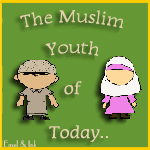A poem I wrote before I graduated dedicated to my high school teachers.
Here is a little something
From me to you
For a very special teacher
I believe this is all true
You have taught me so much
I learned new things from you
Your dedication and hard work
Clearly shines through
Thank you for all you have done for me
I enjoyed the times spent with you
Teachers really do make a difference
I will always remember what they do!
Monday, October 29, 2012
Saturday, October 20, 2012
NEW!!- My Journal Writings: Favorite Islamic Quotes
Since I finished posting all the writing terms from the book "The Complete Idiot's Guide to Creative Writing" (2nd edition) by Laurie E. Rozakis two weeks ago, I thought I would start something new for the next few weeks. Like the title says, these will be my journal writings. They won't be too personal, but worth sharing in my opinion nonetheless. So the first batch will be a few of my favorite Islamic quotes. I have more planned so I hope you enjoy :)
Monday, October 15, 2012
Muslim Women in Islamic History
An essay I wrote for my Journalism class's "mini magazine" project.
According to the Top 10 List’s site, Angelina Jolie tops off the list as number one, followed by Oprah Whinfrey, Beyoncé Knowles, and seven other females chosen to be on the list of the Top 10 Most Influential Female Celebrities. They were “not only chosen for their good looks or fortunes, but also because of their involvement with charity work and their contributions to society.”
According to the Top 10 List’s site, Angelina Jolie tops off the list as number one, followed by Oprah Whinfrey, Beyoncé Knowles, and seven other females chosen to be on the list of the Top 10 Most Influential Female Celebrities. They were “not only chosen for their good looks or fortunes, but also because of their involvement with charity work and their contributions to society.”
While the above women are looked up to by many females, especially teenagers, little, if any thought is given to Muslim women in history. What part did they play in the early years of Islam? Were they looked down upon as many people assume Muslim women are? Is Islam, a religion and complete way of life, responsible for “oppressing” women? I’m sure you will be surprised after you learn about Muslim women in the history of Islam.
Muhmood A. Ghadanfar writes in his book, "Great Women of Islam Who Were Given the Good News of Paradise", “The women companions (Sahabiyat) of Prophet Muhammad were as active in religion as in politics, as courageous in war as in the peaceful and persuasive propagation of the teachings of Islam. These noble selfless women could be found in the battlefields, in the political arena, in the field of education, in the courts of Islamic jurisprudence, in the interpretation of Shariah (the collective laws revealed by Allah), in trade and commerce, in agriculture, in medicine and in nursing. In short there was no sphere that did not benefit from their intellect, their wisdom, and their gentle yet firm strength and character.”
Additionally, it is reported with an authentic chain of narration that the Prophet Muhammad (peace and blessings be upon him) said, “The best women of mankind are four: Maryam (Mary, the mother of Jesus), Aasiyah (the wife of Pharaoh), Khadijah (the wife of Prophet Muhammad), and Fatimah (the daughter of Prophet Muhammad)” [Bukhari and Muslim]. While there were numerous Muslim women in the past who contributed in all spheres of life, below are four of the most well-known women in Islamic history.
Maryam bint Imran, the daughter of Imran, is an honorable and respected woman in Islam. She is free from any false claims associated to her with regards to the birth of Jesus (Esa) and has a whole chapter (#19) in the Quran (the Muslim holy book and the last revelation sent to mankind by Allah) dedicated to her! The reason why Maryam is considered the best of all women is stated in the Qur’an. “Behold! The angels said, “O Maryam! Allah (the One True God of monotheism in the Arabic language) has chosen you and purified you and preferred you above the women of all nations” [al- `Imran 3:42].
Aasiyah bint Muzahim, the daughter of Muzahim and the wife of Fir’awn (Pharaoh), went through harsh trials due to her tyrannical husband. She disbelieved in his false claims of divinity which brought about his anger, thus he would torture her. Due to her strong faith in Allah and rejecting Pharaoh as God, Pharaoh ordered for a big stone to be thrown over her, which caused her death. Her sacrifice for her firm belief brought about her high status compared to other women. Narrated Abu Musa: Allah’s messenger said, “Many amongst men reached (the level of) perfection but none amongst the women reached this level except Aasiyah (Pharaoh’s wife), and Maryam (the daughter of ‘Imran)… [Bukhari].
Khadijah bint Khuwaylid, the daughter of Khuwaylid, was a very successful business women and the wife of Prophet Muhammad. She was also the first person to accept Islam (believe in Allah as the Lord and Creator of the universe and everything in it, and that Muhammad is the last Prophet and Messenger of Allah sent to mankind). She provided support, strength, assurance, and wisdom to her husband through many difficulties and was honored by Prophet Muhammad even after her death.
Fatimah bint Muhammad was the fourth and youngest daughter of Muhammad. She resembled her father the most from her siblings and was the dearest to him. It is reported that Prophet Muhammad (peace and blessings be upon him) said, “Fatimah is a part of me, and what hurts her hurts me” [Muslim]. Before her father’s death, Fatimah was told by him that she would be the first among his family members to join him in Heaven!
Does it make sense to think that after all that Muslim women have done in history, that Islam is the one to blame when people who claim to be Muslims, don’t practice the true teachings of Islam, but rather their culture, tribal and family practices, many times conflicting with Islam? There are reverts to Islam every year especially after September 11, most of them being women! Would it make sense that many women willingly choose to become a Muslim if there was no truth in Islam and benefit? Learn the truth for yourself from reliable sources before you judge!
Check out http://www.islamswomen.com/ for information on Muslim women, and also my blog at http://learnislam2day.blogspot.com/ for information about Islam and Muslims. I also recommend reading "Women in Islam: The Myth and the Reality" by Dr. Sherif Abdel Azeem.
Monday, October 8, 2012
T, V, and W Words
This is the last group of writing terms that I will post from the book "The Complete Idiot's Guide to Creative Writing" (2nd edition) by Laurie E. Rozakis.
3. transitions- words and phrases that give writing coherence.
4. turning point- see climax.
5. verse- a stanza in a poem.
6. voice- the author's personality expressed through his/her writing.
7. writing- a way of communicating a message to a reader for a purpose.
1. theme- a literary work's main idea, a general statement about life. The theme can be stated outright in the work, or readers will have to infer it from details about plot, characters, and setting.
2. tone- the writer's attitude toward his/her subject matter. For example, the tone can be angry, bitter, sad, or frightening. 3. transitions- words and phrases that give writing coherence.
4. turning point- see climax.
5. verse- a stanza in a poem.
6. voice- the author's personality expressed through his/her writing.
7. writing- a way of communicating a message to a reader for a purpose.
Subscribe to:
Posts (Atom)



